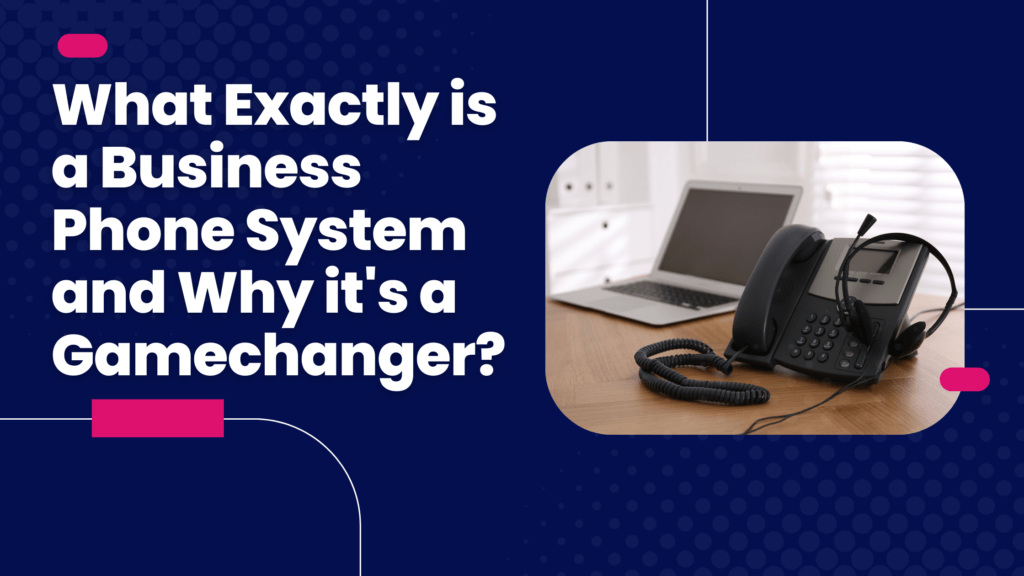Table of Contents
Introduction
The business landscape is ever-evolving, with technology at the heart of this transformation. A pivotal element in this change has been the way businesses communicate, both internally and with their customers. As we delve into the history and the role of technology in business communication, we uncover the significance of the Business Phone System – a tool that has grown from a mere means of making calls to a comprehensive communication solution. This evolution highlights not only the adaptability of businesses to technological shifts but also the increasing importance of efficient communication in today’s fast-paced market.
The Evolution of the Business Phone System
The journey of the business phone system is a testament to technological advancement. From the days of manual switchboards to the era of digital exchanges and now cloud-based solutions, the transformation has been profound. This evolution mirrors the broader shifts in technology and the growing demands of businesses for reliable, flexible communication tools.
The Role of Technology in Business Communication
Technology has redefined the parameters of business communication, making it more accessible, faster, and more efficient. It has paved the way for global operations, remote work, and 24/7 customer service, emphasizing the role of effective communication systems in achieving these milestones.
Relevance of the Business Phone System
In this backdrop, the Business Phone System emerges as a cornerstone of business communication, facilitating seamless interactions within teams and with clients, ensuring that businesses stay connected, responsive, and competitive.
Unveiling the Business Phone System
Definition of a Business Phone System
A Business Phone System is not just about making and receiving calls. It’s an integrated network of hardware and software designed to handle the complex communication needs of businesses, including call handling, voicemail, conferencing, and more.
Core Components of a Business Phone System
The anatomy of a Business Phone System features several key components:
- Central Control Unit (CCU): The brain of the system, orchestrating call routing and integration with other features.
- Endpoints: These include desk phones, softphones, and mobile apps that serve as the user interface for communication.
- Voicemail Systems: Essential for message management and storage.
- Interactive Voice Response (IVR): An automated system that interacts with callers through voice commands or keypad inputs, enhancing customer service.
Preferable Types of Business Phone Systems
Business Phone Systems vary, ranging from traditional landline setups to VoIP (Voice over Internet Protocol) and cloud-based solutions, each catering to different business needs, sizes, and budgets.
The Triple Advantages of Business Phone Systems
Improvement of Business Communication
A robust Business Phone System streamlines communication, ensuring clear, uninterrupted calls, facilitating team collaboration, and allowing for effective management of client interactions.
Cost-efficiency through Optimized Operations
By centralizing communication tools, businesses can reduce operational costs, eliminate inefficiencies, and allocate resources more effectively, resulting in significant savings.
Strengthened Customer Service
An advanced Business Phone System enables features like call forwarding, automated attendants, and customer queues, directly contributing to improved customer service and satisfaction.
Evaluating The Business Phone System as a Gamechanger
The Impact on Business Productivity
A well-integrated Business Phone System can drastically improve productivity by reducing communication barriers, enabling faster decision-making, and fostering a more collaborative work environment.
Transformative Effect on Customer Engagement
With enhanced communication tools at their disposal, businesses can offer personalized customer experiences, build stronger relationships, and increase customer loyalty.
Influence on Business Expansion and Scalability
As businesses grow, their communication needs become more complex. A scalable Business Phone System can effortlessly accommodate this growth, making it easier to enter new markets, add users, and integrate new technologies.
Future of Business Phone System
Technological Advancements and Trends
The future of Business Phone Systems is shaped by ongoing technological advancements, with AI, machine learning, and 5G technology poised to introduce new levels of efficiency, automation, and connectivity.
Impact of Digitization and Cloud Computing
The shift towards digitization and cloud computing offers businesses more flexibility, scalability, and security, driving the adoption of cloud-based Business Phone Systems.
Predictive Analysis on the Future of Business Phone System
The continued emphasis on customer experience and operational efficiency will further cement the role of Business Phone Systems as indispensable tools for communication and collaboration.
Conclusion
In conclusion, a business phone system stands as a pivotal asset for modern businesses, facilitating not just communication but fostering efficiency, productivity, and customer satisfaction. The right system can transform operations, propel growth, and sustain competitive advantage in a fast-paced business environment. As you consider the future of your business communication needs, remember that investing in a robust phone system is not just about technology—it’s about choosing a partner in your success journey.
Embracing a business phone system that aligns with your goals and adapts to your evolving needs can indeed be a gamechanger, propelling your business into new realms of potential and performance.
FAQs
-
What Is a Business Phone System?
At its core, a business phone system is a sophisticated network designed to manage the complex communication needs of businesses. Unlike traditional phone services, business phone systems leverage advanced technology such as VoIP, unified communications, and cloud services to offer a wide range of communication features that can be tailored to the specific requirements of a business. This not only includes handling incoming and outgoing calls but also extends to managing emails, text messages, and even video conferencing, providing a comprehensive communication solution.
-
How does a business phone system improve business productivity?
A business phone system can dramatically improve productivity by streamlining communication processes. For example, features like auto-attendant ensure that calls are automatically directed to the right person or department, significantly reducing wait times and eliminating the need for a receptionist to manually route calls. Similarly, the ability to integrate with CRM systems enables employees to have immediate access to customer information, making interactions more personalized and efficient. By reducing the time and effort required for these tasks, businesses can allocate more resources towards their core activities, driving productivity and profitability.
-
What is the significance of a business phone system?
A business phone system is more than just a tool for making and receiving calls. It is an integrated platform that facilitates seamless communication across various channels, including voice, video, and text messaging, thus enabling businesses to connect with customers and team members anywhere in the world. The significance of a business phone system lies in its ability to enhance operational efficiency, improve customer service, and ultimately contribute to business growth. By allowing for advanced features such as call forwarding, voicemail to email, and conference calling, these systems ensure that businesses can maintain a high level of professionalism and responsiveness.
-
What are the key features to look for in a business phone system?
When choosing a business phone system, several key features should be considered to ensure it meets your business’s needs:
VoIP Technology: Voice over Internet Protocol (VoIP) allows for calls to be made over the internet, offering better flexibility and reduced costs compared to traditional phone lines.
Unified Communications: This feature integrates various communication methods within the business, including voice, video, messaging, and email, into a single platform for more efficient management.
Scalability: The system should be able to grow with your business, allowing easy addition of new lines or extensions.
Mobility: Features such as mobile apps and call forwarding to mobile phones ensure employees can stay connected even when away from the office.
Security: Protecting sensitive information is crucial, so look for systems that offer secure communications and data protection measures. -
What is the best phone system for a small business?
For small businesses, the best phone system is often one that offers flexibility, scalability, and cost-effectiveness without compromising on features. Cloud-based VoIP systems have become increasingly popular for small businesses due to their minimal upfront costs, ease of installation, and the ability to easily scale as the business grows. Furthermore, these systems often come with a suite of valuable features such as analytics, call recording, and CRM integration, providing small businesses with the tools they need to compete effectively in their market.
-
What’s the meaning of VoIP?
VoIP, or Voice over Internet Protocol, is a technology that enables voice communication to be transmitted over the internet. Instead of using traditional phone lines, VoIP converts voice signals into digital data packets and sends them over the internet. This allows for more flexibility, improved sound quality, and cost savings, particularly for businesses with a high volume of international calls. VoIP is a cornerstone technology of modern business phone systems, enabling a range of advanced features and capabilities that traditional systems cannot match.




